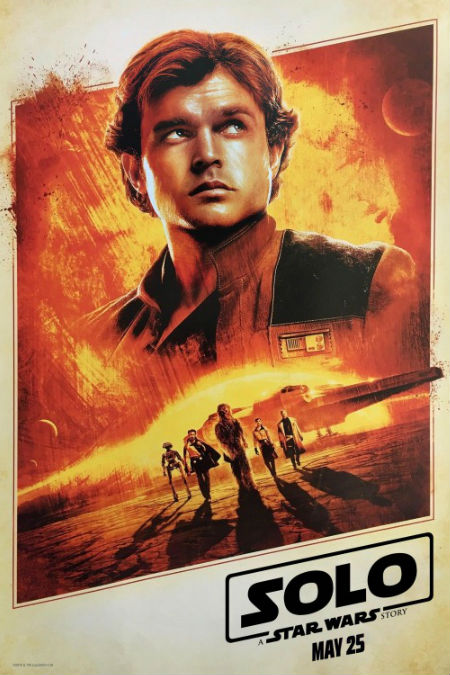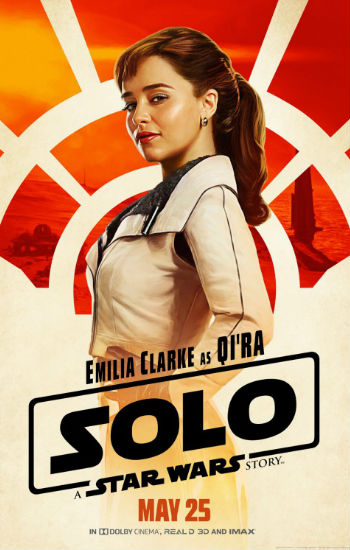
Trying to recapture that effervescent sense of wonder you felt as a child can often feel like a fool’s errand; it’s magical if you succeed but so often elusive that you end up musing on whether all the effort was worth it.
So the wise among us don’t end up trying; if that transcendant sense of possibility and endless adventure ensnares us in its rose-tinted grip then all the good; should it not, we are none the worse off, and can simply enough something for its present-day merits alone.
The inherent gift of Solo: A Star Wars Story is that manages to evoke both that child-like glee and adult appreciation of a movie well made, with sheer adventure running like candy-fuelled adrenaline through its 135 minute running time, so pure and free and unselfconscious in its storytelling that it’s the closest any of the more recent Star Wars instalments have come to the swashbuckling fun of the film that has come to be known, for better or worse, as Star Wars: A New Hope.
In stark contrast to the now-ordained first three films in the franchise which seem too forced and constructed by committee, and the more recent films which are enjoyable but beholding to expectations of adherence to now well-established canon, Solo is a hoot, a return to the gleeful , gung-ho sensibilities that made A New Hope, The Empire Strikes Back and Return of the Jedi such exquisite excursions into old-fashioned battles between galactic good and evil.
Even better, the backstory of Han Solo, who is captured in all his cocky charisma and loveable arrogance by Alden Ehrenreich, a worthy successor and precursor all at once to the justly-revered Harrison Ford, is packed full of heart and meaning, redolent with ideas of love lost, life seized and a thousand other things lost and found in ways big and small.
There is, of course humour threaded throughout, mostly courtesy of feisty equal rights-campaigning droid L3-37 (Phoebe Waller-Bridge), co-pilot to Donald Glover’s preeningly confident Lando Calrissian (who, though, a joy to watch is not the scene-stealer early hype may have led you to believe), who injects levity into situations where there is little to no at hand.

Solo is a heady winning mix of romping adventure and earnest life lessons, emotional evocation sitting cheek by jowl with the wit and cheekiness that we have to expect from dear old Han – pronounce, of course, as “Haan”, a distinction which fuels one joke where our titular protagonist corrects Lando when he goes in with a hard “HAN” – backstory exposition that never feels stodgy or overworked but a brilliant fill-in of missing, or barely articulated details, that seamlessly connects and amplifies the story of later films.
For instance, the much referred-to claim, mostly by Han himself in A New Hope on, that he “made the Kessel Run in less than twelve parsecs” is given real, vivid substance, moving from oft-repeated swaggeringly-delivered tale to a real, substantial thing that unfolds in a major action sequence in the film, replete with revolution, derring-do, grief, chutzpah and some deft black humour.
If you have been doubting the need for any kind of backstory for the iconic mainstays in the Star Wars universe – standalone films are on the way for Boba Fett and possible, though not confirmed, forObi-Wan Kenobi and you can bet your Disney-fied dollar they won’t be the last – then this sequence of gripping, edge-of-your-seat, heartfelt scenes alone should erase any of your lingering concerns.
Or take the moment when Han first meets Lando over a game of Sabacc, similar in spirit and execution to poker, and comes close to winning ownership of the Millenium Falcon – the, again, oft-referred to moment from The Empire Strikes Back when Han and Lando refer to a fateful game when Han does get ownership of one of the most iconic ships in sci-fi comes later on in the film – or when we first see Han and Chewbacca (played in the modern iteration by Joonas Suotamo) in the cockpit together as the well-oiled machine they so often are in the middle third films.
These, or a multitude of other quips, oneliners and significant moments will give any longtime Star Wars fan a thrill, the most pleasing part being that these nostalgic touchpoints never subsume or overwhelm the spirit of this fresh, vibrantly told new story, but instead are woven in with judicious cleverness and an inspired understanding of the need to offer freshness and vivacity and not simply a connected series of well-worn references.
If it were just a matter of ticking a series of Solo mannerisms, character traits and well-loved catchphrases, the producers of this film, which saw more than its fair share of chaotic dislocation while being made, then Lucasfilm could have issued a checklist and been done with it; it certainly would’ve cheaper and less stressful all round.
Thankfully they didn’t – I like lists as much as the next person but it would’ve made for a less than stellar backstory – and what we get instead is a film that wisely, and imaginatively connects all the things we know and love about Han while still offering us the kind of fresh insights and giddily adventurous storytelling that mean the film more than ably stands on its own merits, with or without inclusion in the Star Wars franchise.

Take, for instance, Han’s childhood on the shipbuilding hellhole of Corellia, where our loveable rogue is indentured, along with his love Qi’ra (Emilia Clarke) to a local criminal overlord, Lady Proxima (Linda Hunt) who manages to be more evil and dismissive than any Dickens’ Fagin-like abusers.
In an riveting opening sequence we first see the way Solo responds to his enslavement with the emotional distancing (not clearly not to Qi’ra), grinning quips and hands-off approach to pretty much everything that characterise him in the first half or so of A New Hope.
It’s all there, but naturally so, and as the story unfolds further and we come to understand how hard Han had to work to flee his roots and build a life on his own terms, much of the later scenes in the middle three films take on an extra, richer resonance that, again, bolster the worth of telling any number of characters’ backstories.
Or at least, in this instance, that of Mr Solo himself (how he gets his surname is a moving treat in itself) who ends up in precarious position after tenuous scenario with criminals like Tobias Beckett (Woody Harrelson) and Dryden Vos (Paul Bettany) who complicate his life just as he thinks he has, at long last, caught his much-needed break.
At heart, and A New Hope and its two successive fellow films champion this idea to the heartwarming hilt, Solo is a “good guy” while many around him are not, and yes, while he is very much a self-preservationist, this doesn’t come at the expense of people around him that he cares about, unlike a number of key characters in the film who are considerably more mercenary in their approach to survival.
We see some lovely examples where Solo’s innate goodness disadvantages him more than it benefits him, a character “flaw” (not really because we love him for it) that seems always behind the eight-ball, even as others make it, and make it big, or least appear to (karma, even in a galaxy far, far away and a long time ago is pretty merciless), leading to his first brushes with a number of key elements that come to dominate his life for the better later on.
Ultimately Solo, for all its larger-than-life bravura and sense of grin-inducing fun, and it’s there in massive soul-pleasing quantities, and Ehrenreich’s pitch-perfect capturing of a character we know and love, is a heartfelt testament to being true to your own goddamn self-confident self.
Especially when life conspires to beat you down again and again; as you watch Han rise again and again to trial after tribulation after setback, you can’t help but love and understand him more, which when you think about the role of a backstory, is job well and truly, and resoundingly, well done.